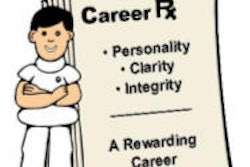AuntMinnie.com is pleased to present part II of an ongoing series on how to survive, grow, and profit from a satisfying career in healthcare informatics, by Dan T. Erler of executive-search firm The Howard Group.
In this segment of what I call the Awareness stage, I offer 20-plus years of experience in recruiting and listening to professionals. My goal: To arm you with a few tools that will help address why you are considering a job change, and determine how outside influencers -- market fluctuations, political or social issues, and the expansive nature of healthcare -- hold significant sway over your decision.
Every business segment has issues. Healthcare has had to adapt from analog (film) to digital (PACS), focusing on building the patient experience, embracing e-whatever, and attracting and retaining quality employees. These are but a few straws in the haystack of issues. Based on a review of the last 26 years, the following saying has never rung more true: "The only constant is change."
The influencers: 1980-2006
You've probably heard the expression "The future is simply the past reinvented." I take exception to such simplifications because the rate of change we are experiencing today is more rapid, and occurring on more levels, then for previous generations. Considering the past 26 years it may be more correct to say: "The future ain't what it used to be." It is essential that we understand and adapt to change more quickly. Let us look at some of the issues that influence our job-changing decisions.
People are changing jobs at an increased rate, evidenced by the fact that more job changes appear on resumes today then what I saw as a recruiter in 1980. Reasons range from valid to incomprehensible, and the influencers are just as varied. Since 1980, the attitude of the employment world has changed. Both the "gold watch for 25 years of service" and "one-company career" employees find themselves on the endangered species list. The 1980s buzz centered on mergers, acquisitions, and downsizing (later changed to rightsizing) activities.
The 1990s embraced outsourcing, and although it was not a new concept, it became part of the corporate vocabulary; mergers, acquisitions, and x-sizing continued. Another factor is that during the '90s there seemed to be fewer younger people entering the market, due in part to the fact that baby boomers delayed having children, and statistically, had fewer children. The boomer impact is beginning to be felt as the race to produce more robust technology tools, which increase the individual's capacity to complete more work in a day (like reading 600,000 images per day), has begun.
The 21st century survived the Y2K scare but experienced a wave of new influencers: wars; rampant legislative activities (HIPAA, the Deficit Reduction Act, Homeland Security, and so on); and ever-changing demographics, which called for multilingual capabilities and programs to take care of our growing senior population. Add to this the high cost of malpractice and the stock market's demands for greater return on investment, and it is easy to see the increased amount of stress placed on healthcare organizations, which trickles down to its employees. Has anyone heard the outsourcing steps getting closer to healthcare?
Let us look at some of the reasons these influencers have had such an impact on why people are changing jobs more often.
Digging for reasons
When asking people why they change jobs, most do not realize the impact of these influencers as part of their reasons for changing. The influencers impose new organizational structures that require employee's support. Some companies do well at reacting to and communicating the change in structure, mission, scope, and vision, while others find the task daunting.
One reason people become dissatisfied is that they feel somehow disconnected to, or lack passion for, the mission of the organization they serve. Employees can become disconnected if change is not managed well. Some changes can occur in organizations without external influencers, such as a simple change in management or implementation of a new set of tools or policies.
The purpose of this article is to help tune your early-warning radar with respect to your particular circumstances. Given the influencers previously mentioned, the list should sensitize you to the reasons the influencers can precipitate impassioned dissatisfaction.
- After a merger or acquisition, a new culture prevails that might make the new environment less desirable as a place to work, affecting attitudes and making it harder to recruit or retain talent.
- The culture has changed and you feel or simply know you no longer fit.
- Your hands are tied with respect to adequate budgets, lead time, project time, user buy-in, tools, or staffing levels to support the responsibilities placed in your charge (on-time, on-budget).
- Personalities may clash as organizations merge, personnel issues go unresolved, and the "missile firing" process completes itself with integrity as its victim (blame game).
- The path to promotion is no longer available due to any number of reasons, or the position available to you is unattractive.
- The job is being outsourced.
- The company embraces the stockholder experience or is so hung up on the customer experience they have forgotten the employee experience.
- "I just got the hang of SQL and now you want me to know HL7? What's this portal thing about?"
- There are other influences tied to personal, rather than, corporate changes.
- You get homesick for your home state of Ohio and your job in Miami is losing its appeal and a transfer to Ohio (or close to it) is not available.
- Aging parents need help back in Maine and you are obliged to take on the new responsibility.
- You have simply lost the passion for what you do.
Limitations are imposed on you in such a manner that you feel held back or positioned for failure.
Many of the reasons people change have roots in organizational change. Naturally, some traditional personnel issues arise with corporate culture changes. You must realize that if your heart (passion) and the organization's heart (return on investment) is not on the same page, something must change.
Ask yourself: "Do I understand how change is affecting my group or me?" If you do not become proactive and find a way to adjust to the change, unresolved issues can steal your energy, dampen your passion, and ultimately become a cause for your desire to leave the department, organization, or the company all together.
Do nothing, change, or change agent
Your choices are threefold: Do nothing and ride it out; change your venue; or become a change agent. You have to be keenly aware of organizational change. Doing nothing for a time (a cooling or warming period) is not all bad. You must be wise and evaluate your contingency plan (you have one, right?). The do-nothing phase may vary from a few days to months; however, keep your career radar tuned so you are not caught by surprise.
If you are looking to change because the organization no longer provides the structure or tools for you to succeed, does not provide adequate leadership, or the grief-to-earnings ratio has gotten out of whack, then changing companies is a possible solution. If you have invested enough time with the company, consider the option of changing departments or divisions before completely leaving it.
Let us take a moment to reflect. Change is often a gradual or a subtle process. Before the negative aspects of change enter too deeply into your thinking, make sure you are making the most of the things you can control.
Are you, or have you, done everything you can do to command your environment? Do you make the most of educational opportunities afforded to you? Do you make the most of your annual reviews? Are performance and behavior issues understood and under control? Have you had an honest (not tactless) discussion with your boss asking, "Do I have a future here?" Do you know what the performance and behavior standards are? If graded on the bell curve, ask: "What does 'meets expectations' mean?"
If 10% can be listed as "exceeds expectations" and 10% must be below, do you know (well in advance of the review) what you should be doing to receive a favorable review for all performance indicators? Are your efforts receiving sponsorships or inviting trouble (anti-sponsors)?
After you have carefully considered your circumstances, both logically and emotionally, and concluded a change is in order, then make the change or risk suffering a decrease in the old self-esteem.
The third avenue is to become a change agent -- someone who tactfully, expertly, becomes the heartbeat of the group and through personal dynamics and hard work, changes the culture. All benefit from the change agent's leadership. Be it from the top, middle, or bottom, change agents are more interested in being a part of the solution than propagating problems. Good change agents improve their "stock" in the organization and the sector they serve, which results in an increase in their market value.
When should I consider leaving?
In the next article of the series, we will wrap up the Awareness phase and examine your current situation by discussing the topic: Have you outlived your stay or your present position? We will look at "mentorships" and into what Aldous Huxley may have meant when he said "They intoxicate themselves with work so they won't see how they really are."
By Dan T. ErlerAuntMinnie.com contributing writer
September 13, 2006
Erler is an executive recruiter and director of healthcare informatics for the Overland Park, KS-based executive search firm The Howard Group. He attended the U.S. Naval Academy, chased submarines, served as a "cultural expressions" instructor, hosted a talk-radio show focusing on senior healthcare, and has worked with the Salvation Army as a board member. He is also author of the forthcoming book, The Job Discovery Wheel -- A Career Journey from Awareness to a Bright Future, scheduled for publication in 2007.
Related Reading
My career in healthcare informatics: Is it still right for me? August 16, 2006
PACS administrator certification efforts heat up, June 20, 2006
Technologists take advantage of 3D opportunity, March 25, 2006
Rad workload shows double-digit increase, September 22, 2005
PACS administrator role requires planning, vigilance, March 11, 2005
Copyright © 2006 Dan Erler



















